The main goal of staffing agencies is to help their clients hire the best people for their roles—doing so makes it easier to win more in business.
And in today’s changing labor market, staffing agencies need to make sure that they’re not only finding the best possible people but also that they’re doing it in a fast and cost-effective way.
Also, staffing agencies are often tasked with filling a variety of roles for multiple clients, which makes designing a good recruitment process even more challenging.
In short, your recruitment game has to be on point to succeed in the competitive staffing industry.
And that’s where candidate assessments come into play.
Using pre-employment candidate assessments, you can verify whether your candidates have the skills and knowledge they need to do the job they’re applying for and move them onto the next stage of the hiring process fast. An effective selection process will also help your staffing agency gain a competitive advantage.
So which assessments are the best to use as a staffing agency? Here are our top 7 suggestions.
1. Cognitive ability assessment
A cognitive ability assessment is one of the most popular tests used by businesses during the pre-employment phase.
Cognitive ability is considered a great predictor of job performance at every career level and across industries, so a cognitive ability assessment is a good choice if you want to find out how successful candidates could be across a wide range of jobs.
Here’s how the test works in a real-life scenario.
If you’re hiring contact center staff for a client, you know that your candidates will be spending a lot of time talking to customers and multitasking in a busy environment, so a lot of general skills will need to be tested. That’s why you will want to assess a candidate’s verbal reasoning skills to ensure they are effective communicators, as well as their logical reasoning abilities to evaluate their problem solving skills.
It’s important to do this because figures show that 78% of consumers pull out of purchasing because of poor interactions with contact center employees. By using a cognitive ability assessment, staffing agencies are making sure that they are shortlisting candidates with good levels of cognitive skills.
Pro-tip: Want to learn more about cognitive ability assessments? We’ve got a complete guide here.
2. Situational judgement testing
Next, situational judgement testing (SJT) assesses candidates on specific tasks tied to the role and the company they’re applying for. These tests can be interactive, video-based, but also text-based.
So how can you utilize SJTs as a staffing agency hiring for different roles and different clients?
You can implement industry- and role-specific SJTs that allow you to test a candidate’s responses to typical situations they might encounter on a particular job. They should include scenarios that are common for the role across different companies.
The test mainly focuses on a candidate’s behavior; how they would behave in a certain situation and lean on knowledge to help them make decisions.
Harvard Business Review says that while SJTs give candidates a problem to solve, there won’t necessarily be a right and wrong answer.
“Instead, experts or judges determine which answers are most and least desirable. These tests are typically untimed and focus more on tacit knowledge or practical know-how than on reasoning performance. And their content is more explicitly connected to a particular job role than is the content of traditional aptitude tests.”
For example, if you are hiring for a contact tracer position, you could test a candidate’s competence by presenting them with a scenario like this:
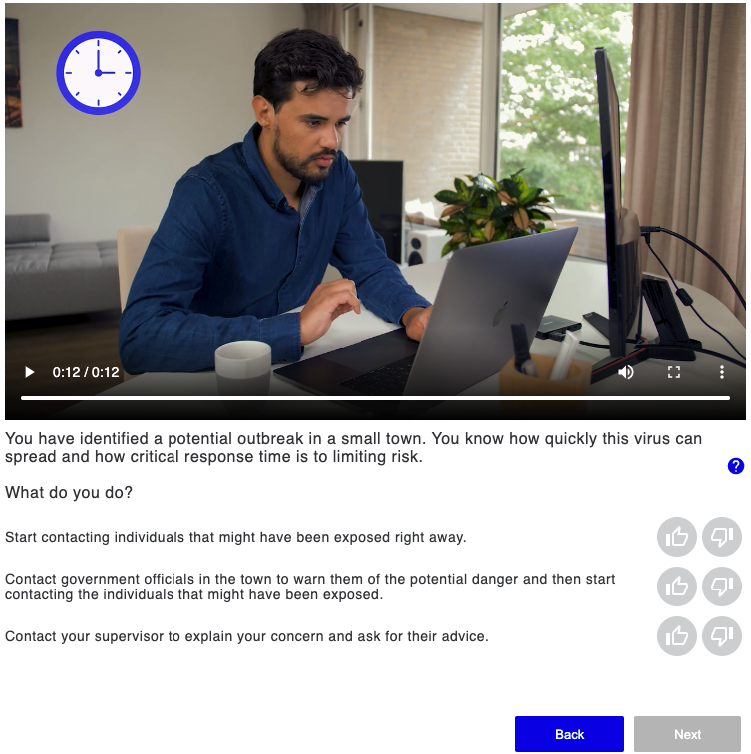
The candidate’s answer to questions like these and others about problem analysis and prioritization gives you a realistic preview of how they would respond to situations if you place them for a role.
SJTs also benefit the candidate. By showing a potential hire what they will be required to do in your staffing agency testing, SJTs can significantly reduce employee turnover by managing a candidate’s expectations of a job role.
3. Personality questionnaire
Hiring the best person for the job goes beyond hard skills and experience—they must have the necessary soft skills or even certain personality traits to be successful in the role.
So, it’s crucial to uncover candidates’ strengths and learn more about their personality before placing them for a job. Introducing a personality questionnaire into your hiring process does just that.
For example, for customer service roles, you will want to hire people who have good conversational skills and are accurate and efficient in their job role. But, you should also seek out candidates who are friendly and show strong interpersonal skills when they’re talking with customers. If a candidate has all of the right skills on paper but is not comfortable engaging in conversations or showing a sense of calmness when trying to problem-solve with customers, a customer support role might not be the best placement for them.
When choosing a personality questionnaire to include in your recruitment process, look for a scientifically validated questionnaire, for example, based on HEXACO personality inventory. It should allow you to set benchmarks on scores per role so that you can which candidates fit which role best.
Not only will this questionnaire give you an overall idea of a candidate’s personality during the hiring process, but you can also share the results with the candidate and provide them with an insight into their personality. Even if you don’t end up hiring the candidate, they can then use this information to sharpen their skills for their next job application.
Stop guessing,
Start data-driven hiring.
Learn how you implement a modern candidate selection process, that is: streamlined, experience-driven and backed by data.
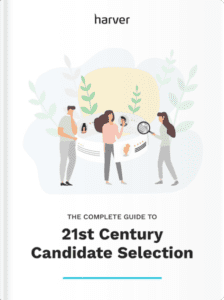
4. Language proficiency assessment
In an efficient recruitment process, it’s important that before you decide to interview someone, you gather as much information about them as possible.
So if you’re looking for candidates for roles where good knowledge of a certain language is key, you should test their proficiency in that language.
You can conduct a general language proficiency test as part of your initial candidate assessment, which tests candidates’ level of vocabulary, grammar, and reading comprehension.
However, you can go a step further and evaluate candidates’ oral language skills before even speaking to them. A spoken language assessment that uses advanced voice recognition will help you test your applicants’ pronunciation and fluency, and you can be sure that you’re shortlisting only candidates whose language skills are on the required level.
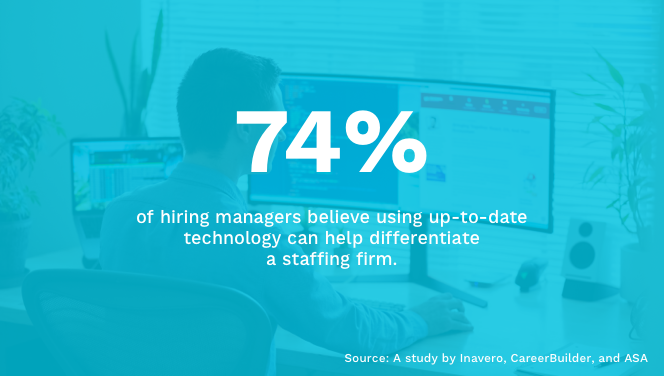
5. Multitasking test
Most roles in today’s workplace require employees to multitask, so it’s important you test how good a candidate’s short term memory is and if they can switch between tasks.
A multitasking test can be a useful staffing agency test that assesses a candidate’s ability to manage several pieces of information at a time while also ignoring information that doesn’t help them move forward with the task at hand.
For example, a contact center employee might be getting asked questions by a customer, and while they listen to those questions, they’ll need to be searching for information to answer them and keeping a dialogue at the same time. It’s harder than it sounds, especially when contact center staff also have to log data about their communications and eventually—solve the customer’s problem.
Assessing a candidate’s ability to do this before making a placement is essential to ensure that they can keep up with what’s required of them.
6. Job knowledge test
How much does your candidate really know about the job they’re applying for?
It’s not enough to simply trust the skills and experience listed on a candidate’s resume. That’s why recruiters must cross-check resumes against job knowledge tests that assess a candidate’s expertise in specific areas they’ll need to work in a role.
Of course, what’s in a job knowledge test will depend on the role you are hiring for. However, as a staffing agency, you have multiple roles that you need to find people for, and in different companies. What you can do is categorize these positions into job families and create a short job knowledge test for each of them.
That way, you can assess if a candidate has the basic knowledge of the job at the very beginning of the recruitment process and then you can further test their skills in later stages of the process.
7. Virtual interview
Finally, virtual interviews are an ideal way to add a qualitative element to your candidate assessment process.
A virtual interview allows recruiters to speed up hiring efforts and continue the recruitment process even when traditional face-to-face interviews are not possible.
There are two types of virtual interviews:
- One-way virtual interviews: Often referred to as on-demand video interviews, one-way virtual interviews are presented in either text or video form. A candidate records their answers to pre-selected questions, which are then submitted back to the recruiter.
- Two-way virtual interviews: Are conducted in real-time between a recruiter and candidate, and are usually recorded so the interview can be shared between other people at the company before a hiring decision is made.
As virtual interviews give recruiters the chance to share recorded responses with other team members, it gives everyone a chance to collaborate and make sure the right person is being matched to the right role—efficiently and effectively.
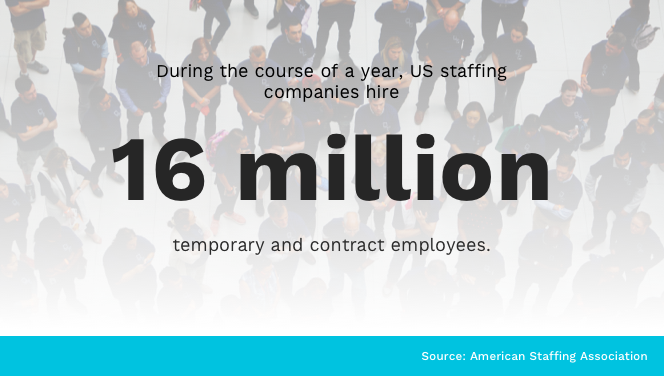
There’s a demand from both employers and employees for flexibility that temporary and contract employment offers.
General candidate assessment tips for staffing agencies
Tip #1: Keep it short and sweet
Don’t drag out the candidate assessment process or add tests that won’t help you make better hiring decisions.
As your role might not be the only one a candidate is applying for, you want to make sure that you respect their time. Try and make any assessment you incorporate into your hiring process as short and engaging as possible to not only keep your candidate interested but to cut down on the time takes to analyze the results of each test.
Tip #2: Ensure mobile-friendliness
58% of Glassdoor users today are looking for jobs on their mobile phones. However, mobile job seekers also successfully complete 53% fewer applications.
So if you want to get good candidates in, your recruitment process must be mobile-friendly, too.
The easiest way to test this out is to go through your company’s application and assessment process yourself and ask yourself questions like:
- Do the assessments load quickly?
- Do they fit onto the screen and are they easy to complete on a mobile device?
- Are the assessments accessible across all mobile devices, and not just some?
Keep in mind that this part of the hiring process is also a reflection of your company. If your assessments take a long time to load or they aren’t compatible with a candidate’s device, that could cause a candidate to go to another staffing agency instead. On the back of that, it might impact their decision on whether or not they want to continue their application at all.
Tip #3: Integrate your assessment tools with your ATS
The use of tech should make hiring easier—not harder. That’s why recruiters must check that any candidate assessment tool they invest in integrates with their ATS.
The good news is, a lot of these tools now easily integrate into existing ATS to make hiring more efficient and effective.
Tip #4: Gather feedback
To improve the effectiveness of your recruitment process, you need to create a feedback loop with your clients.
How happy are they with the candidates you’re sending to them? How does that differ per client and/or per role? By collecting this feedback, you can continuously improve your candidate assessment and selection process.
However, it’s just as important to gather feedback from your candidates. Even if you don’t end up hiring them, it’s still crucial to touch base with them and ask what the experience was like for them.
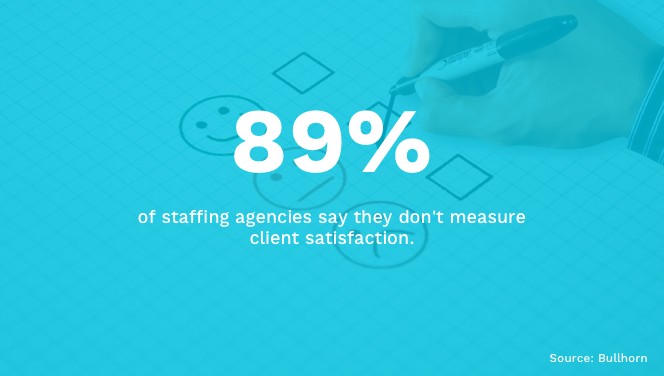
…and 79% say they don’t measure candidate satisfaction. However, this valuable data helps you optimize your recruitment and selection process and get ahead of your competition.
Now, it’s your turn
High-quality candidate assessments will help you stand out from the staffing industry crowd and allow you to select great candidates who match your clients’ requirements.
Make sure that you pick the right candidate assessments for each role. Whether you’re testing general employability or transferable skills or job knowledge, assessments can drastically improve your hiring process and ultimately—the quality of your candidates.
Stop guessing,
Start data-driven hiring.
Learn how you implement a modern candidate selection process, that is: streamlined, experience-driven and backed by data.



